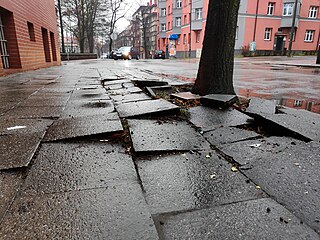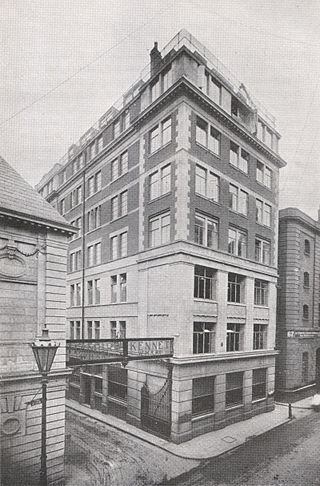
A disclaimer is generally any statement intended to specify or delimit the scope of rights and obligations that may be exercised and enforced by parties in a legally recognized relationship. In contrast to other terms for legally operative language, the term disclaimer usually implies situations that involve some level of uncertainty, waiver, or risk.

In tort law, a duty of care is a legal obligation that is imposed on an individual, requiring adherence to a standard of reasonable care to avoid careless acts that could foreseeably harm others, and lead to claim in negligence. It is the first element that must be established to proceed with an action in negligence. The claimant must be able to show a duty of care imposed by law that the defendant has breached. In turn, breaching a duty may subject an individual to liability. The duty of care may be imposed by operation of law between individuals who have no current direct relationship but eventually become related in some manner, as defined by common law.

English tort law concerns the compensation for harm to people's rights to health and safety, a clean environment, property, their economic interests, or their reputations. A "tort" is a wrong in civil law, rather than criminal law, that usually requires a payment of money to make up for damage that is caused. Alongside contracts and unjust enrichment, tort law is usually seen as forming one of the three main pillars of the law of obligations.
In the law of torts, an invitee is a person who is invited to land by the possessor of the land as a member of the public or one who enters the land of another for the purpose of business dealings with the possessor of the land. The status of a visitor as an invitee defines the legal rights of the visitor if they are injured due to the negligence of the property owner.
In the English law of negligence, the acts of the claimant may give the defendant a defence to liability, whether in whole or part, if those acts unreasonably add to the loss.
Premises liability is the liability that a landowner or occupier has for certain torts that occur on their land.
Public liability is part of the law of tort which focuses on civil wrongs. An applicant usually sues the respondent under common law based on negligence and/or damages. Claims are usually successful when it can be shown that the owner/occupier was responsible for an injury, therefore they breached their duty of care.
Roles v. Nathan [1963] 1 W.L.R. 1117, [1963] 2 All E.R. 908 is an occupiers' liability case in English tort law. It concerns s.2(3)(b) of the Occupiers' Liability Act 1957, which states,
"An occupier may expect that a person, in the exercise of his calling, will appreciate and guard against special risks ordinarily incident to it, so far as the occupier leaves him free to do so."
Gwilliam v West Hertfordshire Hospital NHS [2002] EWCA Civ 1041; [2003] Q.B. 443 is an English tort law case concerning occupiers' liability under the Occupiers' Liability Act 1957. It also raises the question of whether the duty of care should encompass a duty to enquire into the insurance status of contractors for dangerous activities.

The Occupiers' Liability Act 1957 is an Act of the Parliament of the United Kingdom that covers occupiers' liability. The result of the Third Report of the Law Reform Committee, the Act was introduced to Parliament as the Occupiers' Liability Bill and granted royal assent on 6 June 1957, coming into force on 1 January 1958. The Act unified several classes of visitors to property and the duty of care owed to them by the occupier, as well as codifying elements of the common law relating to this duty of care. It also covered the duty owed to parties to a contract entering the property and ways of excluding the liability for visitors. The Act introduced an element of liability for landlords who failed to maintain their properties and were as a result responsible for the injury of a non-tenant, something counter to the previous common law rule in English law. The Act is still valid law, and forms much of the law relating to occupiers' liability in English law along with the Occupiers' Liability Act 1984.
Occupiers' liability is a field of tort law, codified in statute, which concerns the duty of care owed by those who occupy real property, through ownership or lease, to people who visit or trespass. It deals with liability that may arise from accidents caused by the defective or dangerous condition of the premises. In English law, occupiers' liability towards visitors is regulated in the Occupiers' Liability Act 1957. In addition, occupiers' liability to trespassers is provided under the Occupiers' Liability Act 1984. Although the law largely codified the earlier common law, the difference between a "visitor" and a "trespasser", and the definition of an "occupier" continue to rely on cases for their meaning.

Nettleship v Weston [1971] 2 QB 691 is an English Court of Appeal judgment dealing with the breach of duty in negligence claims. In this case the court had considered the question of the standard of care that should be applied to a learner driver, and whether it should be the same as is expected of an experienced driver.
The following outline is provided as an overview of and introduction to tort law in common law jurisdictions:

The Occupiers' Liability Act 1984 is an Act of the Parliament of the United Kingdom that covers occupiers' liability for trespassers. In British Railways Board v Herrington 1972 AC 877, the House of Lords had decided that occupiers owed a duty to trespassers, but the exact application of the decision was unclear. The matter was then referred to the Law Commission for a report, and as a result the Occupiers' Liability Bill was introduced to Parliament by Lord Hailsham on 23 June 1983. The Act was given the royal assent on 13 March 1984 as the Occupiers' Liability Act 1984 and came into force on 13 May.

Smith v Eric S Bush [1990] UKHL 1 is an English tort law and contract law case, heard by the House of Lords. First, it concerned the existence of a duty of care in tort for negligent misstatements, not made directly to someone relying on the statement. Second, it concerned the reasonableness of a term excluding liability under the Unfair Contract Terms Act 1977, s 2(2) and s 11.

Donoghue v Folkestone Properties Limited (2003) is an English court case heard in the Court of Appeal of England and Wales concerning the tort of occupiers' liability from the Occupiers' Liability Act 1984.

Morris v CW Martin & Sons Ltd [1966] 1 QB 716 is an English tort law case, establishing that sub-bailees are liable for the theft or negligence of their staff. Both Lord Denning and Diplock LJ rejected the idea that a contract need exist for a relationship of bailor and bailee to be found. Accordingly, it established an authority in vicarious liability, that employers are fully liable for the thefts - by employees - of goods that they have a duty to take care of.

The Defective Premises Act 1972 is an act of the Parliament of the United Kingdom that covers landlords' and builders' liability for poorly constructed and poorly maintained buildings, along with any injuries that may result. During the 19th century, the common law principle that a landlord could not be liable for letting a poorly maintained house was established, while a long-running principle was that, in practice, builders could not be sued for constructing defective buildings. The courts began to turn against the first principle during the 20th century, imposing several restrictions on the landlord's immunity, but the landlord was still largely free from being sued.

Dutton v Bognor Regis Urban District Council [1972] 1 QB 373 is an English contract law and English tort law case concerning defective premises and the limits of contract damages. It was disapproved by the House of Lords in Murphy v Brentwood DC and is now bad law except in Canada and New Zealand.

Weir-Rodgers v SF Trust Ltd [2005] IESC 2 is a reported decision of the Irish Supreme Court that confirmed that under Section 4 of the Occupiers Liability Act 1995 an occupier of land is not required to take all reasonable care to safeguard the person or property of either trespassers or recreational users.